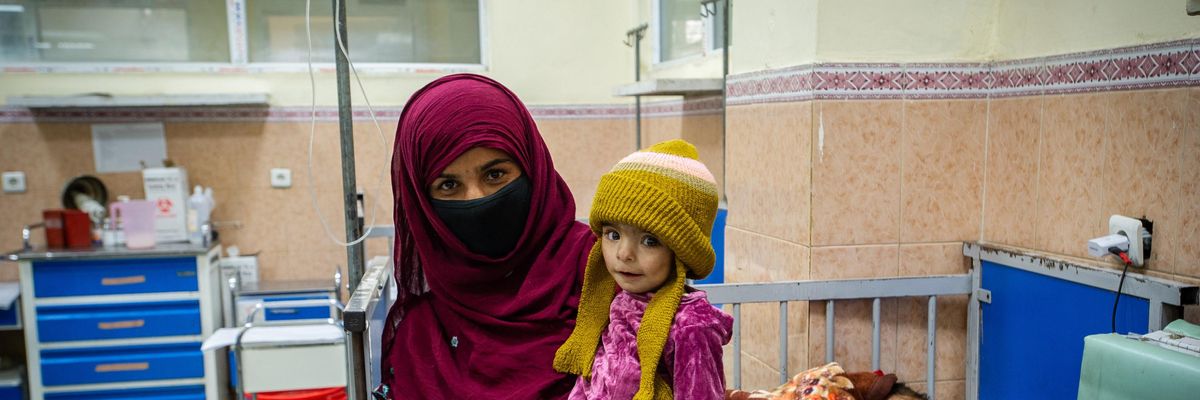More than 70 economists and other academic experts sent a letter to U.S. President Joe Biden and Treasury Secretary Janet Yellen on Wednesday urging them to allow Afghanistan's central bank to access the foreign exchange reserves frozen by Washington and to persuade other governments to lift the "coercive economic restrictions" that are exacerbating the suffering of the Afghan people.
"The full $7 billion belong to the Afghan people."
"We are deeply concerned by the compounding economic and humanitarian catastrophes unfolding in Afghanistan, and, in particular, by the role of U.S. policy in driving them," states the letter, which was signed by 71 leading intellectuals including Jayati Ghosh, Heidi Shierholz, Yanis Varoufakis, and Nobel laureate Joseph Stiglitz, among others.
The letter implores Biden and Yellen "to take immediate action to confront this crisis, above all by allowing the central bank of Afghanistan, Da Afghanistan Bank (DAB), to reclaim its international reserves."
Just a few months after the U.S. military withdrew from Afghanistan last August and the Taliban regained power following two decades of war that killed hundreds of thousands of people and cost trillions of dollars, Biden commandeered $7 billion worth of DAB assets held at the Federal Reserve Bank of New York, putting millions of people in the poverty-stricken country on the verge of starvation.
Several U.S. allies "have implemented similar policies," the letter notes, "blocking access to an additional $2 billion" and helping to plunge Afghanistan's economy into "a dire state."
As the letter states:
The World Bank predicts that by the end of the year, real GDP per capita will have declined by 30% since the end of 2020. At the same time, prices of basic necessities have skyrocketed. The International Committee of the Red Cross reports that "since June 2021, the price of wheat flour has increased by up to 68%, cooking oil by 55%, fertilizer by 107% and diesel by 93%." Seventy percent of Afghan households are unable to meet their basic needs. Some 22.8 million people--over half the population--face acute food insecurity, and 3 million children are at risk of malnutrition. Reports abound of desperate Afghans forced to sell their own organs to afford food for their families. The International Rescue Committee warns: "the current humanitarian crisis could lead to more deaths than twenty years of war."
Many factors have contributed to this crisis, including drought; the global impacts of the war in Ukraine, particularly on food and fuel prices; and the Taliban's governance. Furthermore, international aid accounted for 40% of Afghanistan's GDP and 75% of public spending in 2019; its rapid evaporation following the Taliban takeover thus removed one of the central pillars of the Afghan economy and the source of many people's salaries. Despite the issuance of various general licenses and guidance documents, fear of running afoul of U.S. sanctions has led many financial institutions to limit or block all transactions with Afghan bank accounts.
However, the "de facto seizure" of roughly $9 billion in foreign reserves, which were "built up at great opportunity cost over the course of decades," has "contributed mightily to Afghanistan's economic collapse," the letter emphasizes.
Citing a recent statement by Human Rights Watch--which argued that the hunger and health crisis in Afghanistan is "at its root a banking crisis"--Mark Weisbrot, co-director of the Center for Economic and Policy Research and a signatory of the letter, told Common Dreams that "the biggest contributor to this crisis is the U.S. confiscation of Afghanistan's central bank reserves."
"This is not an attack on the Taliban so much as it is an attack on the people of Afghanistan, some 20 million of whom are facing hunger, malnutrition, and starvation," said Weisbrot. "The confiscation of reserves and other economic sanctions by the U.S. and its allies constitute collective punishment; they are contributing enormously to this death and destruction."
Related Content
'Unfreeze Afghan Funds' Demanded After 13,000 Newborns Die From Malnutrition
Julia Conley
Andres Arauz, the former general director of Ecuador's central bank who fell just short of winning the country's presidential election last year, also signed the letter. He recently wrote from his experience as a central banker to explain why foreign reserves are indispensable to the Afghan economy.
"Without access to its foreign reserves," states the new letter to Biden and Yellen, "the central bank of Afghanistan cannot carry out its normal, essential functions. Without a functioning central bank, the economy of Afghanistan has, predictably, collapsed."
According to the letter, "The people of Afghanistan have been made to suffer doubly for a government they did not choose. In order to mitigate the humanitarian crisis and set the Afghan economy on a path toward recovery, we urge you to allow DAB to reclaim its international reserves."
Although the economists are "heartened" by recent talks between U.S. and Taliban negotiators, who discussed initiatives to "preserve $3.5 billion in Afghan central bank reserves for the benefit of the Afghan people" and "build international confidence" in DAB, they stressed that "by all rights, the full $7 billion belong to the Afghan people."
Biden's decision to divide the funds it seized last year in two--reserving $3.5 billion for families who lost loved ones on September 11 despite the objections of many of those family members--"is arbitrary and unjustified," states the letter, "and returning anything less than the full amount undermines the recovery of a devastated economy, where millions of people are starving."
"The Taliban government has done horrific things, including but not limited to its appalling treatment of women and girls, and ethnic minorities," the economists acknowledged. "However, it is both morally condemnable and politically and economically reckless to impose collective punishment on an entire people for the actions of a government they did not choose."
Noting that they are joining a large and growing chorus of human rights advocates who are calling for the immediate, lifesaving release of DAB assets, the signatories wrote that "delays have cost Afghanistan's people and economy dearly."
"Only a fully motivated effort to revive Afghanistan's central bank is enough," they added, "to begin rebuilding its broken economy for the benefit of all Afghan women, men, and children."





